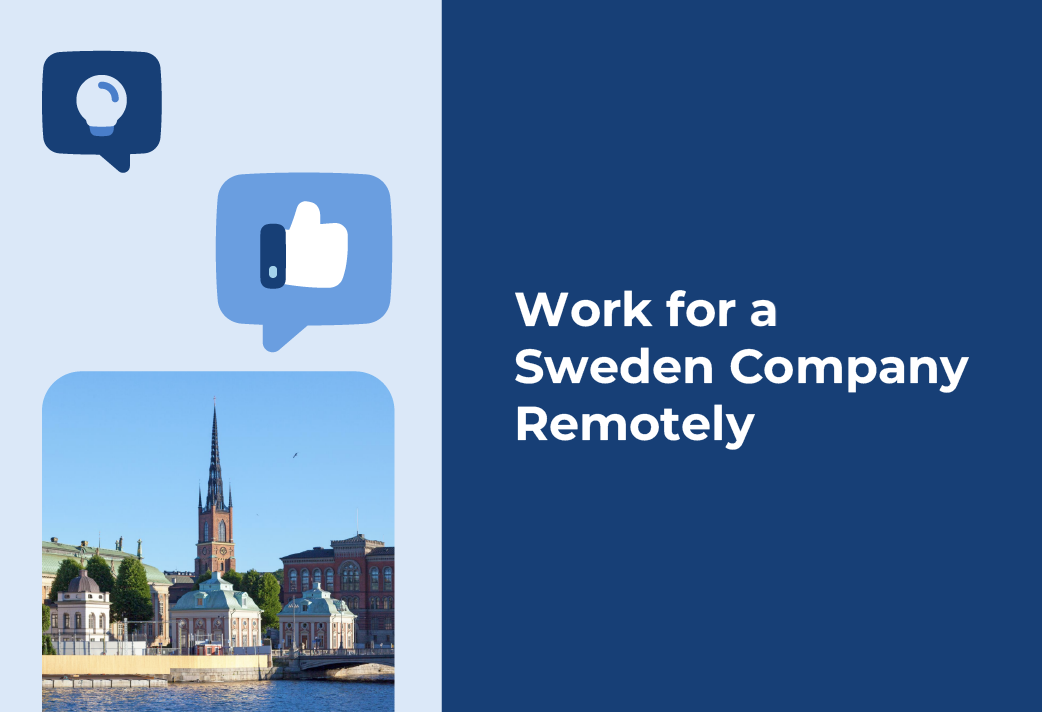As remote work becomes increasingly common, many professionals are exploring opportunities to work for companies across the globe, including those in Sweden. If you’re considering such an arrangement, it’s important to understand the logistical, legal, and practical aspects of choosing to work for a Swedish company remotely. This guide provides a comprehensive overview to help you navigate this process successfully.
Can I Work for a Swedish Company Remotely from Overseas?
Yes, you can work for a Swedish company from overseas. In fact, Sweden came third on a list of countries most likely to hire US workers remotely according to Deel. Sweden’s progressive and inclusive business environment welcomes international talent, something that has also encouraged Swedish companies to look abroad for remote talent. However, there are several factors to consider before accepting such an opportunity.
First, ensuring compliance with the employment laws of both Sweden and your home country can be tough as different legal systems multiply the level of complexity involved. This kind of compliance assurance might involve securing necessary work permits or visas, depending on where you are and what kind of citizenship you have, as well as the type of employment contract you’ll be working under.
Additionally, understanding the tax treaties between Sweden and your country of residence is crucial to avoid double taxation and other potential tax issues.
As each country’s employment regulations vary, it’s essential to ensure that your employment contract complies with relevant laws in both Sweden and your home country.

Tired of scrolling? Download a PDF version for easier offline reading and sharing with coworkers
How Do Employer of Record Services Work When Being Employed Outside of Sweden?
Employer of Record (EOR) services offer a practical global expansion solution for companies wishing to hire international employees without establishing a legal entity in the employee’s country.
For companies based in Sweden but hiring abroad, EORs handle all aspects of employment, including hiring employees, payroll, taxes, benefits, and compliance with local labor laws. They do this be becoming the legal employer of workers on behalf of client companies. For employees, working through an EOR means you are legally employed and can focus on your job without worrying about administrative hurdles.
These services ensure that all payments are made in compliance with local labor laws, and take over the management of employee benefits like health insurance to ensure safety and satisfaction.
Can I Work for a Swedish Company Remotely Through an EOR?
Absolutely. Working remotely for a Swedish company through an EOR allows both the employer and employee to benefit from the flexibility of remote work without an entity in another country.
In this case, an EOR can act as the legal employer, taking care of all administrative and legal requirements, including payroll, taxes, and benefits, which simplifies the process for everyone involved.
However, it’s key to check that such a labor relationship is allowed under the employment law of your country of residence before getting started.
How Much Does an EOR Cost?
The cost and cost-effectiveness of an EOR can vary widely based on several factors, including the services provided, the employee’s salary, and the country of employment. Typically, EOR services charge a fee based on a percentage, usually ranging from 10% to 20% of an employee’s monthly salary.
There may also be additional fees for setup and ongoing support. While there is a cost associated with EOR services, many companies find that the benefits—such as time savings, reduced administrative burdens, and ensured compliance—outweigh these expenses. For a detailed cost breakdown, you can visit EOR cost information.
Are There Risks or Limitations to Working Remotely for a Swedish Company?
While there are many benefits, the decision to work for a Swedish company remotely also brings challenges. Ensuring adherence to regulations in both Sweden and your home country is crucial for legal and tax compliance, adding extra steps or delays to any changes you make, especially if being employed through a newly formed legal company entity.
Additionally, working across different time zones can pose challenges and restrict the type of work you do with colleagues, but effective communication strategies and tools can help mitigate these issues.
Several bigger risks are also associated with choosing to work for a Swedish company remotely. In particular, navigating tax obligations can be complex, and failure to comply with tax laws can result in fines or legal action.
Different countries have varying labor laws, and misclassifying employment status (e.g., contractor vs. employee) can lead to legal complications and financial penalties.
Go Global with World-Class EOR Services from INS Global
INS Global’s Employer of Record services provide a comprehensive solution for companies looking to expand their global workforce. By partnering with INS Global, companies can hire and manage international talent confidently, ensuring compliance with local laws and regulations.
INS Global handles all aspects of employment—from payroll and taxes to benefits and compliance—allowing companies to focus on their core business objectives while leveraging a global talent pool.
When making the decision to work for a Swedish company remotely, the situation offers numerous opportunities but also comes with specific challenges that must be taken into account before getting started. Understanding the legal, tax, and compliance requirements is crucial for a successful remote working arrangement but require added steps or specialist knowledge.
That’s why Employer of Record services, such as those provided by INS Global, can significantly simplify the process, ensuring compliance and allowing both companies and employees to benefit from the flexibility and opportunities of remote work.
Contact our expansion experts today to learn more.

Working for a Swedish Company from a Foreign Country Like the US
Choosing to work for a Swedish company remotely is feasible from countries like the United States, Canada, or elsewhere. Key considerations include securing the appropriate work permits and understanding tax treaties between Sweden and your home country to ensure compliance and avoid double taxation.
Using an EOR can simplify these processes by handling legal and administrative tasks on your behalf.
Living in Sweden and Working for a Foreign Company
Many expatriates living in Sweden work remotely for companies based in other countries. If you fall into this category, remember that as a resident of Sweden, you must report your worldwide income and comply with local tax regulations.
Tax treaties can provide tax credits or exemptions to prevent double taxation, and an EOR can assist in simplifying tax compliance and meeting all legal requirements.

SHARE